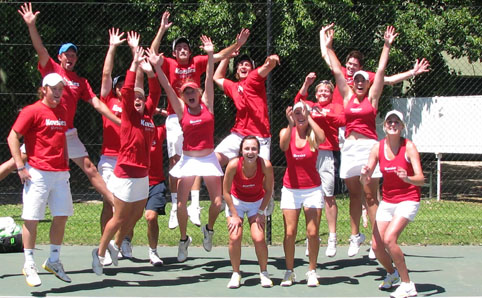 |
| The UFS tennis team won the goldprize at this year's USSA-tournament. |
For the fifth time in a row, the tennis team of the University of the Free State (UFS) won gold at the tennis championships of the University Sports South Africa (USSA) tournament. The tournament was held from Monday 5 December 2011 till Friday 9 December 2011 at the University of Stellenbosch, where 21 teams from 18 tertiary academic institutions participated.
After the USSA tournament, four Kovsie players were included in a training group to take part in training camps, tournaments and trials in preparation of the Confederation of University and College Sport Association (CUCSA) Games to be held in Namibia in 2012. These four students, namely Duke Monro, Christi Potgieter, Elizna Barnard and Este Portgieter, were also selected for the training group to the World Student Games (Universiade) in Russia in 2013.
In 2010, six of the players from the UFS were included in the South African team to the CUCSA Games in Botswana. This year the UFS produced three players to the Universiade in China.
The coach and team manager of the Kovsie team, Marnus Kleinhans and Janine de Kock, were also appointed coach and manager of the South African Student team to the CUCSA and World Student Games for the next two years.